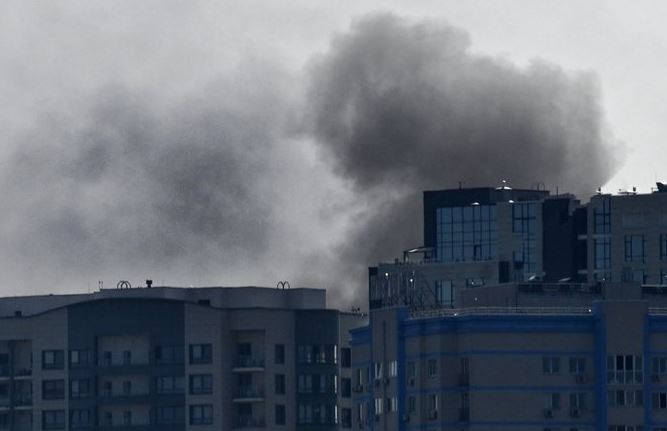Ukrainian authorities issued fresh air raid alerts across the country on Tuesday as Russian bombers took to the skies, just a day after Moscow launched a “massive” assault on Ukraine’s power grid.
On Monday, Russia unleashed a barrage of hundreds of drones and missiles, killing at least four people and dealing a significant blow to Ukraine’s already strained energy infrastructure. The attacks triggered widespread blackouts, coming shortly after Kyiv reported new advances in its incursion into Russia’s Kursk region.
Also Read: Biden Condemns Russian Attacks, Vows Continued U.S. Support for Ukraine
Ukraine’s air force confirmed early Tuesday that several Tu-95MS bombers took off from the Engels airfield in western Russia, prompting air raid alerts nationwide.
Overnight, Russian strikes claimed the lives of at least four more people—two in southeastern Zaporizhzhia and two in the central city of Kryvyi Rig, where a missile hit a hotel. Two more individuals are missing in Kryvyi Rig, possibly trapped under rubble, according to regional governor Sergiy Lysak.
On Monday, President Volodymyr Zelensky described the Russian assault as “one of the largest” to date, with Moscow launching at least 127 missiles and 109 drones. Ukrainian forces managed to shoot down 102 missiles and 99 drones, according to Ukrainian Air Force Commander Mykola Oleshchuk, who called it Russia’s “most massive” attack yet.
The United States and Britain quickly condemned the assault. U.S. President Joe Biden called it “outrageous,” while British Foreign Secretary David Lammy labeled it “cowardly.” Germany’s foreign ministry added, “once again, Putin’s Russia is saturating Ukraine’s lifelines with missiles.”
Impact on Civilians and Infrastructure
The attacks forced state-owned electricity supplier Ukrenergo to implement emergency power cuts to stabilize the grid, causing disruptions to train schedules. Residents in Kyiv rushed to metro stations for shelter as air raid sirens blared, with AFP reporters hearing the booms of what appeared to be air defenses. “We are always worried. We have been under stress for almost three years now,” said Yulia Voloshyna, a Kyiv resident.
Since Russia’s invasion in February 2022, large-scale drone and missile strikes on Ukraine, particularly targeting energy infrastructure, have become a common tactic.
Russia’s defense ministry confirmed that Monday’s strikes targeted energy facilities, claiming they were aiding Ukraine’s “military-production complex.” The attacks killed at least four people and wounded over 20 others across the country, with two more killed in later strikes.
Poland’s Airspace Breach
NATO member Poland reported that its airspace was likely violated during the barrage, possibly by a drone. “We are probably dealing with the entry of an object on Polish territory,” said General Maciej Klisz, operational commander of the armed forces. Army command spokesman Jacek Goryszewski suggested it was “highly likely” the object was an Iranian-designed Shahed-type drone used by Russia.
Poland’s report adds another layer of tension to the ongoing conflict, with Ukrainian President Zelensky urging European air forces to collaborate with Ukraine’s F-16s and air defense systems to counter future drone and missile threats.
International Reactions and Ongoing Conflict
The aerial assault followed the death of Ryan Evans, a safety advisor for Reuters, who was killed in a missile strike on a hotel in eastern Ukraine on Saturday. The strike, which occurred in Kramatorsk, a city under Ukrainian control, raised further international condemnation. Britain’s Foreign Secretary Lammy expressed his sorrow over the incident, while the Kremlin insisted the strike targeted military infrastructure.
As the conflict rages on, Ukraine continues to strengthen its positions in critical regions like Donetsk, where the fight to defend logistical hubs remains intense. Meanwhile, in Russia, a fire broke out at an oil refinery in Omsk, with authorities not ruling out a possible link to the ongoing conflict. Loud explosions were reported near the refinery, which is operated by Russian oil giant Gazprom.
Ukraine has increasingly targeted oil and gas infrastructure in Russia with drone attacks, sometimes striking far from the border, in a conflict that shows no signs of abating.



